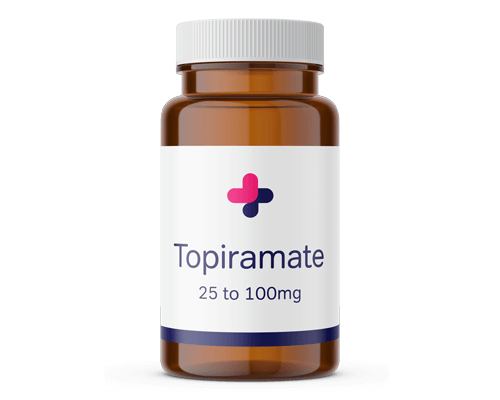What side effects can occur with Topiramate?
Occurring in more than 1 in 100 people, the most common side-effects from Topiramate include:
- Nausea
- Feeling sleepy, dizzy or tired
- Diarrhea
- Depression
- Speech/memory difficulties
- Tingling sensation in the hands/feet
- Loss of appetite/ weight loss
The above side effects are considered mild and usually resolve as your body adjusts to the medication. However, if symptoms persist or worsen, inform your doctor immediately.
More serious side-effects from Topiramate (occurring in less than 1 in 10,000 patients) include:
- Blurred/reduced vision or eye pain
- Pain in the back or stomach accompanied by a burning sensation when passing urine
- Feeling faint
- Irregular heartbeat
- Bone pain
- Unusual bleeding/bruising
Tell your doctor immediately if you experience any of the above symptoms or any other side effects that have not been listed.
Precautions
Be sure to drink plenty of water while taking Topiramate – preferably 6 to 8 glasses per day – as the medication increases the risk of forming kidney stones.
You should not drive or use heavy machinery when taking Topiramate, as it can cause drowsiness, dizziness or weakness. Additionally, avoid alcoholic beverages and marijuana which can augment these potential side effects.
Topiramate can reduce sweating, making it more difficult for your body to cool down. While you are taking the medication, avoid exposure to heat and warm weather, and activities that can cause you to overheat, such as vigorous exercise or use of hot tubs and saunas.
Inform your doctor if you notice any negative changes in your mood or thoughts, including any suicidal thoughts while taking Topiramate.
If for any reason you decide to stop taking Topiramate, always consult your doctor before doing so. Stopping the medication abruptly can result in serious complications. To avoid these potential complications, your doctor will reduce your dosage gradually.
Contraindications
Topiramate may be unsuitable or potentially harmful for some patients. In such cases, your doctor can often prescribe a safe alternative for treating migraines. Always report the following to your doctor before taking Topiramate:
- Allergies to any of the active or inactive ingredients in Topiramate
- Any medications, both prescription and non-prescription that you are currently taking, including any vitamins or herbal supplements – particularly vitamin C or calcium supplements.
- Any history of mental illness including depression or thoughts of suicide.
- A history of metabolic acidosis, a condition where the body produces excess acid or is unable to properly expel it.
- If you are pregnant, planning to become pregnant or breastfeeding.
- If you are due to undergo surgery including any dental procedures.
- A history of kidney, liver or breathing problems.
- Eye problems, particularly glaucoma.
Drug interactions
Before taking Topiramate, it is important to inform your doctor of all other medications you are taking as it may decrease the efficacy of certain drugs and/or increase your risk for side-effects, particularly:
- Hormonal contraception – Topiramate may reduce the effectiveness of products such as the pill, patch or ring, thereby increasing your chances of getting pregnant.
- Products that cause drowsiness such as alcohol, marijuana, muscle relaxants, antidepressants, narcotic pain relievers or antihistamines.
- Anti-epileptic medications
- Antipsychotic medications
- Blood thinning medications
- Medication for diabetes
- Medication for heart problems or high blood pressure
- St John’s Wort
Can I drink alcohol whilst taking Topiramate?
While serious side effects are unlikely to occur from mixing alcohol and Topiramate, the combination can lead to drowsiness, dizziness and lethargy, and may impair both judgement and coordination.
Are there foods or drinks I should avoid?
You are able to eat and drink as normal while taking Topiramate; however, if you experience nausea as a side-effect, stick to bland foods and try not to eat anything that is rich or spicy.

















Quick and discreet
I ordered Azithromycin tablets for chlamydia treatment, received it next day in a brown discreet pack, and cheaper than all other pharmacies, can't ask for more
Jordan McCann